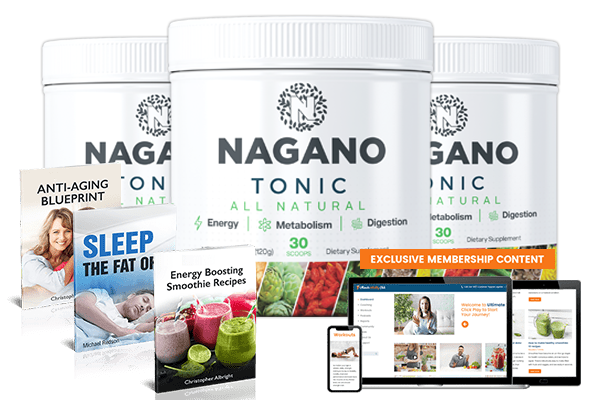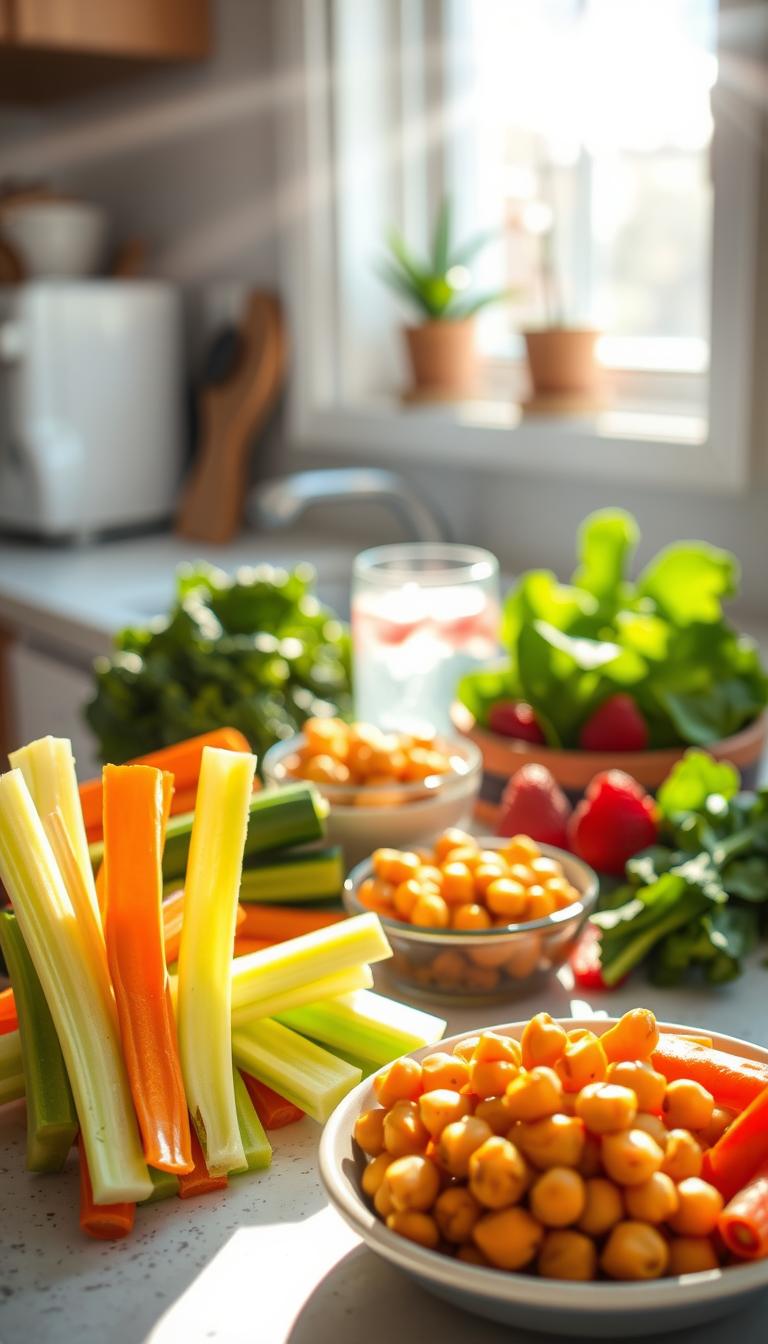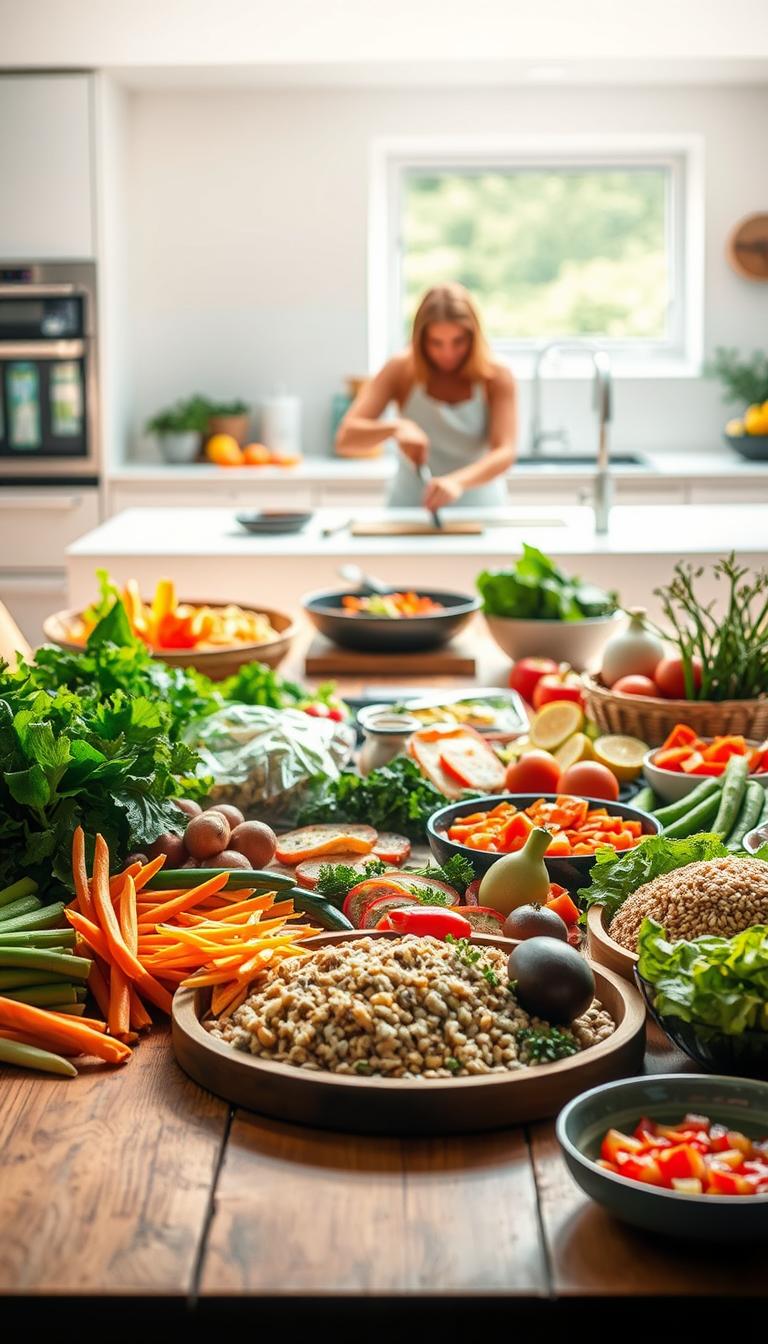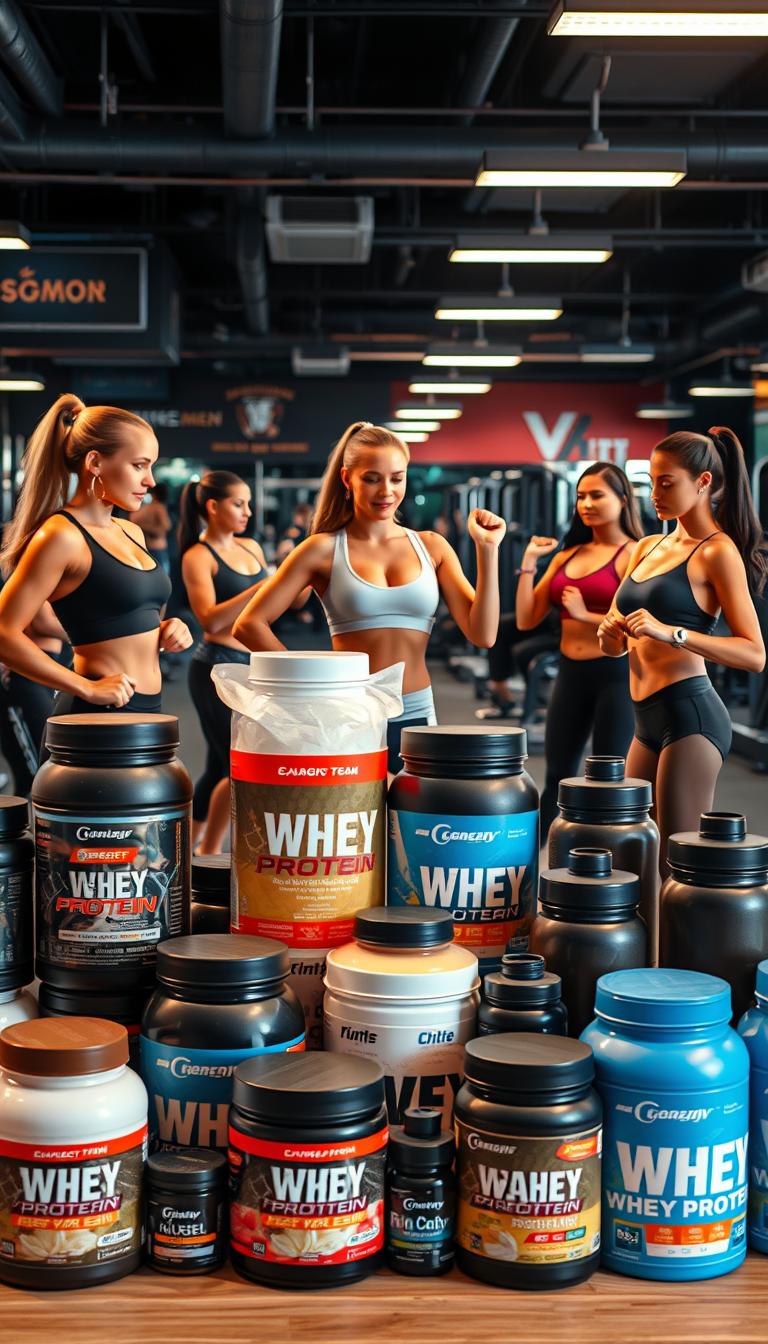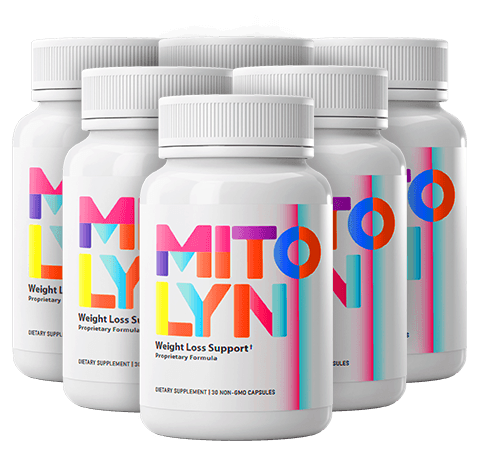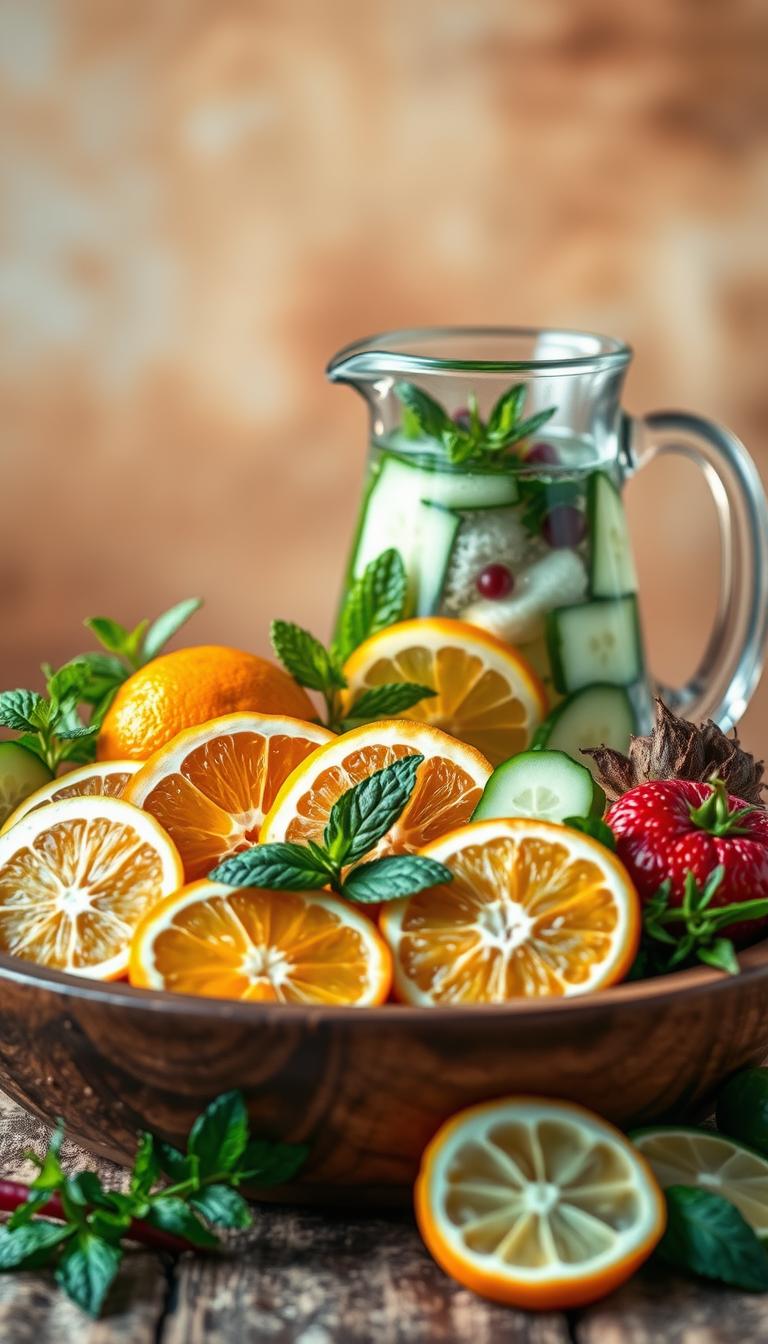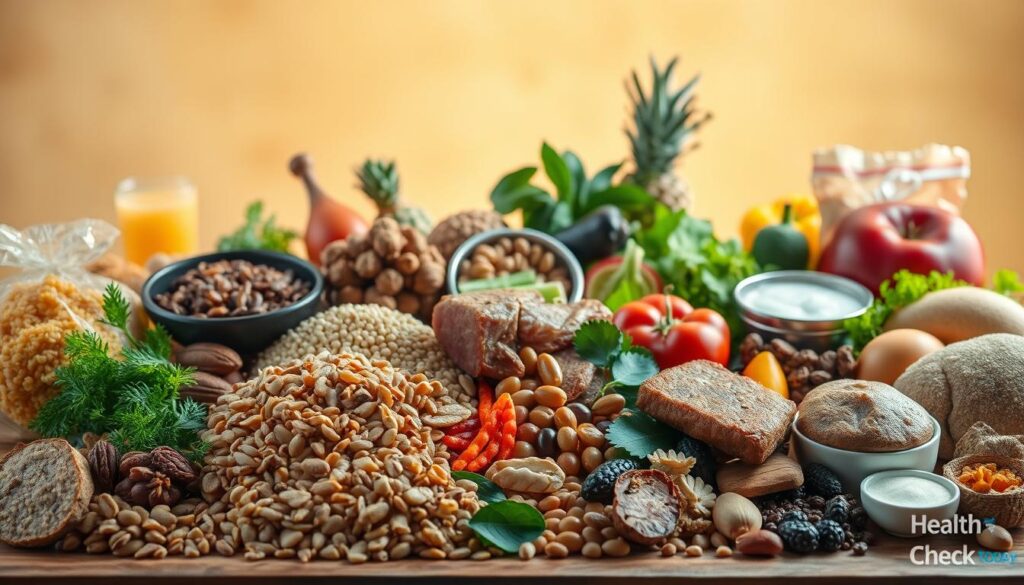
Struggling to add pounds without feeling stuffed? You’re not alone. Healthy weight gain isn’t about eating junk. It’s about making smart choices that boost calories and nutrients.
Imagine sipping a creamy protein smoothie with almond butter and bananas. Or enjoying a hearty meal of salmon and whole-grain rice. This guide shows you how to choose the best foods for healthy weight gain. These foods nourish your body and taste great too.
Gaining weight the right way means fueling your muscles with real ingredients. This includes eggs, nuts, and oats. It’s about building strength, not just numbers on a scale.
Whether you’re recovering from illness, training for a marathon, or simply want to feel stronger. We’ll break down how to pick nutrient-rich options. These options work for your lifestyle.
Key Takeaways
- Eat 5–6 smaller meals daily to boost calories gradually.
- Focus on calorie-dense foods like nuts, avocados, and whole milk.
- Protein-rich choices like salmon or eggs support muscle growth.
- Consult a dietitian to tailor your plan for your needs.
- Smoothies and dips make adding calories easy and tasty.
Understanding Healthy Weight Gain: More Than Just Calories
Healthy weight gain is more than just eating more. It’s about eating the right foods. Being underweight can weaken your immune system and bones. So, picking nutritious foods for weight gain is crucial. Let’s explore how to get stronger, not just bigger.
The Difference Between Healthy and Unhealthy Weight Gain
Healthy weight gain means building muscle and energy with balanced food. Unhealthy options use empty calories from sugary snacks or fried foods. Here’s how they differ:
- Healthy: Lean meats, whole grains, and avocado
- Unhealthy: Chips, candy, and fast food
Why Quality Nutrition Matters for Weight Gain
Choosing the right foods to help gain weight is key for long-term health. Foods like nuts, Greek yogurt, and sweet potatoes are full of protein, fiber, and healthy fats. They help build muscle and energy without the dangers of processed foods. For instance:
- Omega-3 rich salmon boosts heart health while adding calories
- Steel-cut oats add fiber and slow-digesting carbs
Nutrition is the foundation of lasting progress. Don’t trade health for numbers on the scale.
Setting Realistic Weight Gain Goals
Aim to gain 0.5–1 pound weekly. Track progress through strength gains, energy levels, and body measurements—not just the scale. A BMI under 18.5 means your body lacks essential nutrients. Work with a healthcare provider to set goals tailored to your needs. Remember, patience is key—sustainable gains take time.
Why Some People Struggle to Gain Weight
Even with the top foods for gaining healthy weight, some find it hard. Genetics, health problems, or mental health issues can make it tough. Let’s look at these challenges and how to overcome them.
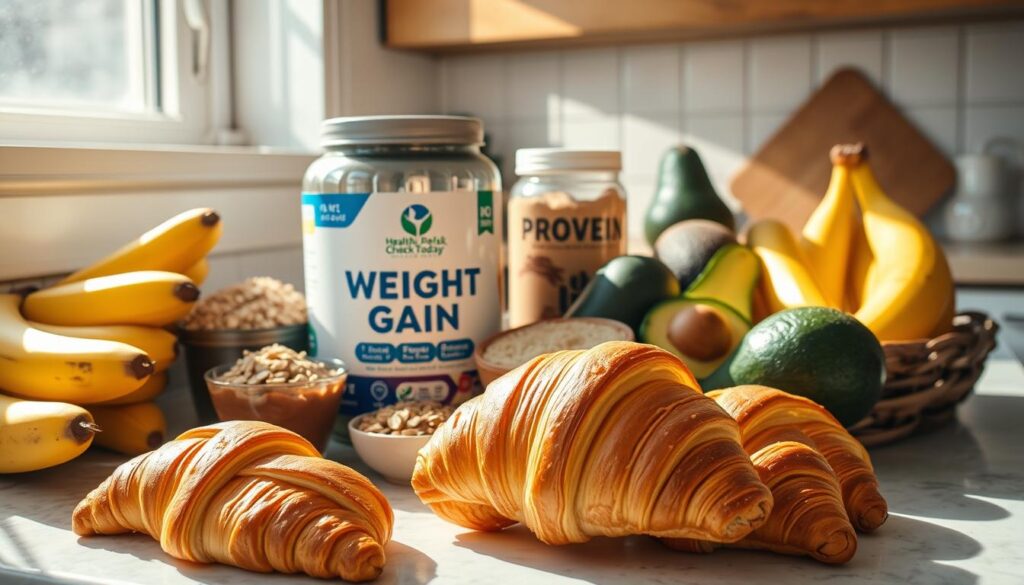
Genetic Factors in Metabolism
Your DNA affects your metabolism. Some people burn calories fast. You might need to eat more or choose foods like nuts or whole grains. Even with a fast metabolism, the right weight gain diet foods and a plan can help.
Health Conditions That Affect Weight Gain
Medical issues can block your weight gain. Here are some examples:
- Hyperthyroidism: speeds metabolism, causing rapid calorie burn.
- Inflammatory bowel disease (IBD): conditions like Crohn’s reduce nutrient absorption.
- Type 1 diabetes: high blood sugar leads to calorie loss in urine.
- Medications: Chemotherapy or antidepressants can lower appetite.
Talk to your doctor to manage these conditions and adjust your diet plan.
Psychological Barriers to Weight Gain
Stress, anxiety, or past eating disorders can make eating enough hard. Fear of gaining weight or societal pressure to stay thin might lead to undereat. If mental health affects your eating, therapy or counseling can help.
Everyone’s journey is unique. By addressing these barriers, you can create a plan that works for you. Upcoming sections will explore the best weight gain diet foods and strategies to help you succeed.
Nutrient-Dense Healthy Weight Gain Foods You Should Try
Building muscle without unhealthy habits starts with the right foods. Focus on healthy weight gain meal ideas that combine nutrients and calories well. High-calorie foods for weight gain should give your body protein, healthy fats, and complex carbs. Let’s explore options that nourish your body while supporting gradual weight gain.
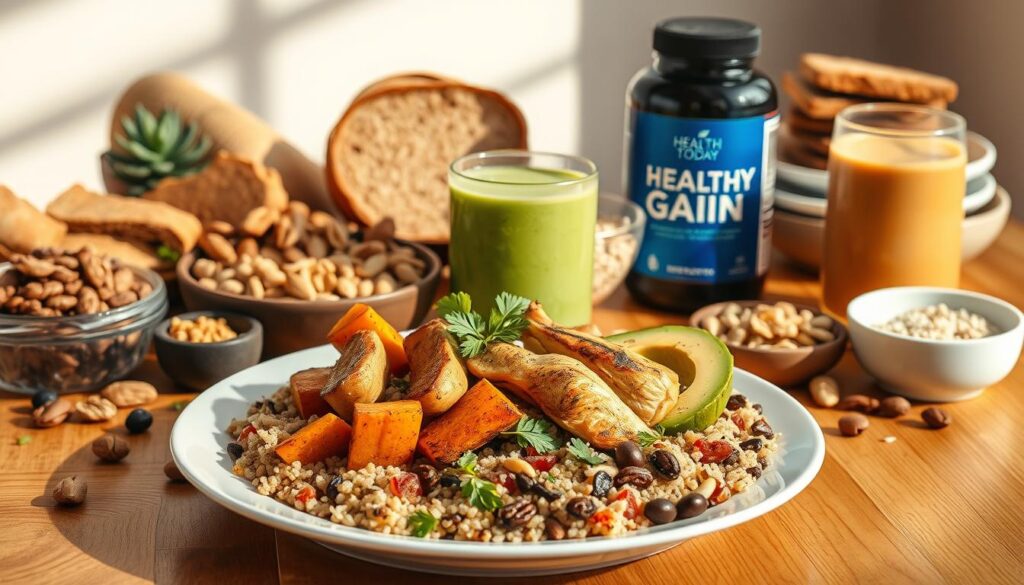
Start by choosing calorie-dense foods that provide vitamins and minerals. For example, a half avocado adds 250 calories and healthy fats. A 1-ounce nut serving offers 160–200 calories. Here’s a quick guide to key foods:
| Food Item | Calories per Serving | Key Nutrients |
|---|---|---|
| Almonds (1 oz) | 163 | Protein, fiber, vitamin E |
| Full-fat Greek yogurt (1 cup) | 240 | Protein, calcium, probiotics |
| Trail mix (¼ cup) | 170 | Fats, protein, fiber |
| Avocado toast | 250 | Healthy fats, fiber |
Pair these foods strategically. Add peanut butter to whole-grain toast for 200+ extra calories. Or mix nuts into oatmeal. Aim for 300–500 extra calories daily to gain 0.5–1 pound weekly. Adjust portions gradually to avoid overwhelming your stomach. Small, frequent meals work best—try a mid-morning yogurt parfait or an evening snack of cottage cheese with fruit.
Protein-Rich Foods for Building Muscle Mass
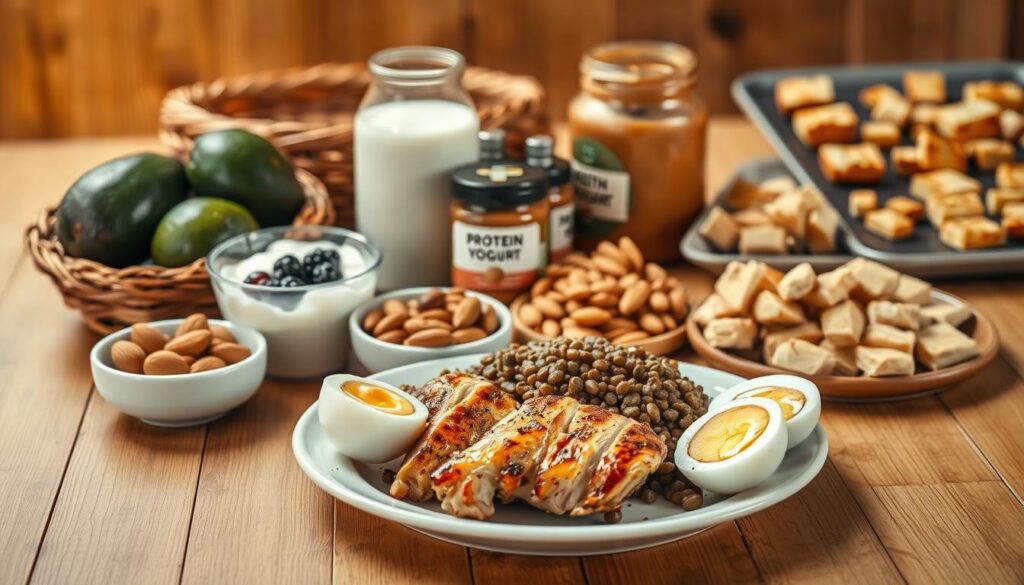
When you’re adding foods to gain weight, focus on protein. These foods help grow muscle and keep your diet balanced. Here’s how to pick the best ones for your goals:
Lean Meats and Poultry Options
Lean meats have lots of protein but little fat. Try these:
- Chicken breast: 26.7g protein per 3 oz (85g) serving
- Salmon: 17g protein + omega-3s for heart health
- Beef tenderloin: 23g protein per 4 oz with leucine to boost muscle synthesis
Plant-Based Protein Sources
Plant-based foods like legumes and tofu have all the amino acids you need. Here’s a quick comparison:
| Food | Protein per Serving | Additional Nutrients |
|---|---|---|
| Edamame | 13g per oz | 8g fiber |
| Black beans | 8g per ½ cup | Fiber-rich carbs |
| Tofu | 12.68g per 100g | Calcium for bones |
Pair legumes with grains like quinoa (8g protein/cup) for complete proteins.
Dairy and Egg Products for Protein
Eggs and dairy give you fast-absorbing protein. Try these:
- Whole milk: 8g protein/cup + calcium
- Greek yogurt: 23g/cup (choose full-fat for extra calories)
- Eggs: 6.3g each – eat 2-3 daily for easy gains
Pair these foods with healthy fats like avocado to boost calorie intake. For a quick shake, mix whey protein (50g/scoop) with almond butter for a muscle-building snack.
Carbohydrates: The Foundation of Your Weight Gain Diet
Carbs are often misunderstood, but they’re crucial for energy. To gain weight healthily, choose nutritious foods for weight gain with complex carbs. These give steady energy and important nutrients without empty calories.
- Brown rice: High in fiber and B vitamins, adding 215 calories per cooked cup.
- Sweet potatoes: Offer 103 calories per medium potato with vitamin A and fiber.
- Quinoa: A complete protein with 222 calories per cooked cup, packed with magnesium.
- Whole-grain pasta: Supplies 200 calories per 2-ounce serving and keeps you full.
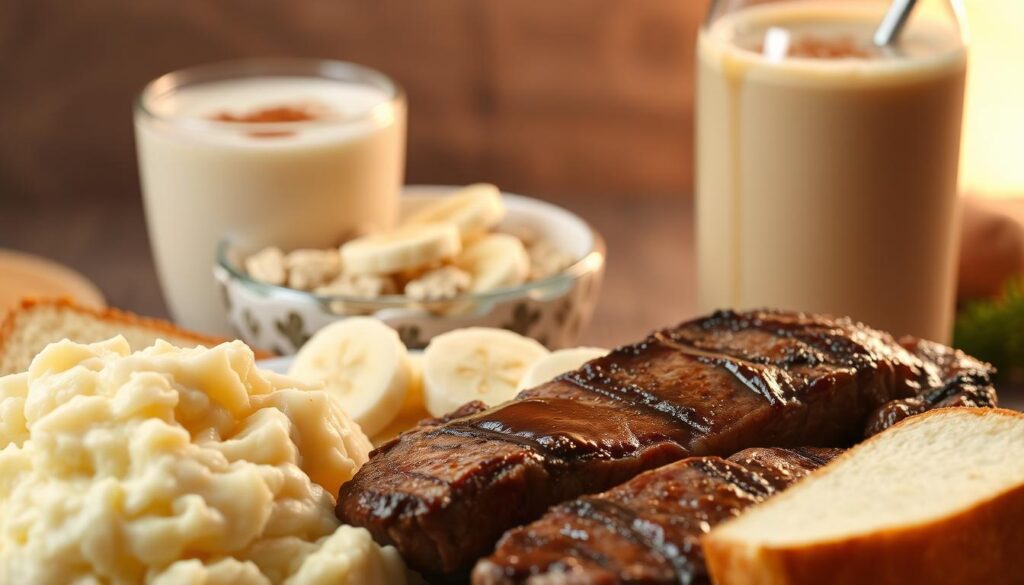
Choose complex carbs like legumes, beans, and starchy vegetables. They digest slowly, keeping energy levels stable.
Pair carbs with fats or proteins to boost calorie intake. For example, top oatmeal with almond butter or mix avocado into whole-grain toast. The Dietary Guidelines suggest carbs should make up 45-65% of your daily calories. Aim for at least 225-325 grams daily if consuming 2,000 calories.
Whole grains like oats retain nutrients lost in refined versions. Opt for brown rice over white rice to get more fiber. The American Heart Association advises limiting added sugars found in candy or soda, which lack nutrients. Focus instead on complex carbs like lentils (230 calories per half-cup) or barley.
Include these best foods for healthy weight gain in every meal. Add whole-grain snacks like popcorn or trail mix between meals to boost intake. Prioritize quality carbs to fuel workouts and support muscle growth without compromising nutrition.
Healthy Fats That Pack a Caloric Punch
Healthy fats are great for high-calorie foods for weight gain. They add calories without making you feel full. They also give you vitamins and minerals. Here’s how to choose the best fats for your goals.
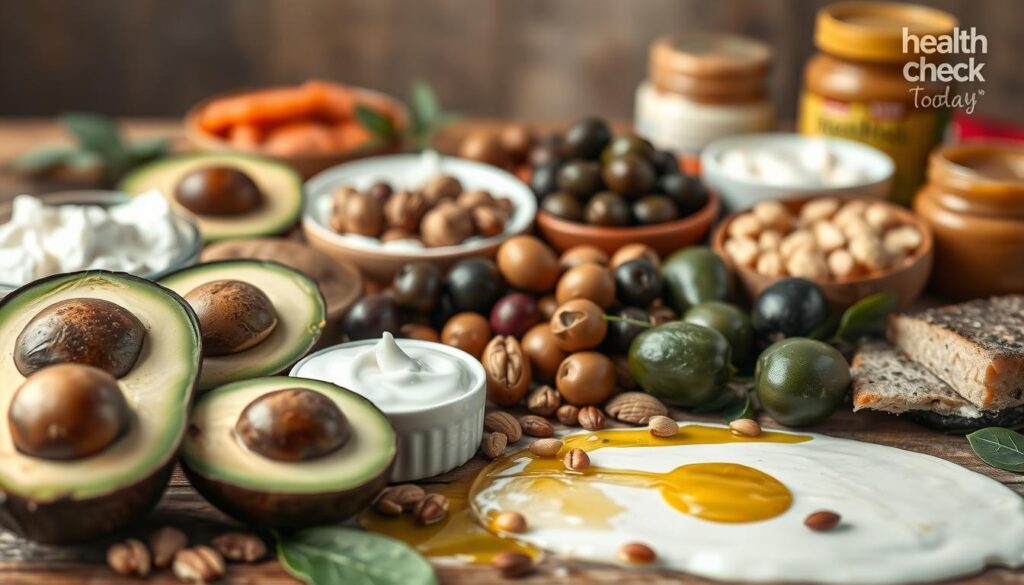
“Two servings of fatty fish per week support heart health and provide essential fats for balanced weight gain.” – American Heart Association
Here are some calorie-rich foods to add to your diet:
| Food | Serving Size | Calories | Nutrient Highlights |
|---|---|---|---|
| Almonds | 1 oz (28g) | 164 | Protein, vitamin E, magnesium |
| Avocado | ½ medium | 161 | Monounsaturated fats, fiber |
| Chia Seeds | 1 tbsp (12g) | 60 | Omega-3s, fiber |
| Salmon | 3 oz (85g) | 195 | Omega-3s, protein |
Here are some tips to add them to your daily meals:
- Add foods to help gain weight like almond butter to oatmeal or smoothies.
- Drizzle olive oil over veggies or salads for extra calories.
- Snack on ¼ cup walnuts (205 calories) for a quick fat boost.
Choose high-calorie foods for weight gain like avocado slices on toast or a handful of cashews (157 calories per oz). They are easy to add and full of nutrients. Focus on monounsaturated fats and omega-3s for health and weight.
Calorie-Dense Smoothies and Beverages for Easy Weight Gain
Smoothies are great healthy weight gain meal ideas for adding calories. They mix top foods for gaining healthy weight like protein powder and nuts. This makes them a quick, nutritious choice for any time.
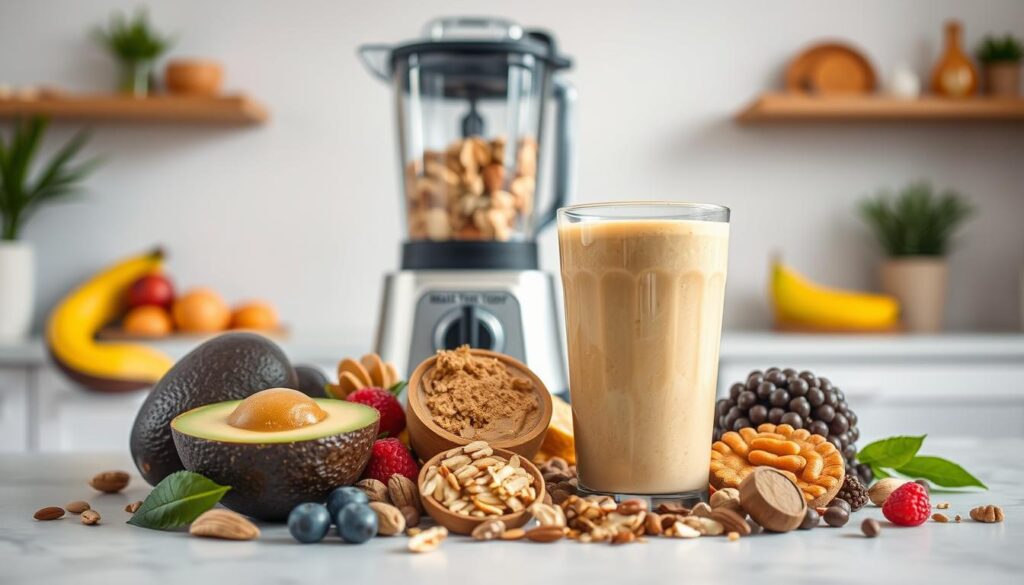
Protein Shake Recipes for Weight Gain
Try these shakes to add muscle-building calories:
- Chocolate Peanut Butter Shake: Blend 1 banana, 1 scoop chocolate whey, and 1 tbsp nut butter (587 cal, 30g protein). Great post-workout).
- Vanilla Berry Smoothie: Mix frozen berries, vanilla protein, whole milk Greek yogurt, and ice (491 cal, 28g protein).
- 1,000-Calorie Smoothie: Combine spinach, avocado, banana, pineapple, and protein (1,100 cal, 69g protein for intense gainers).
Fruit & Veggie Smoothies with Added Calories
Add calorie-dense ingredients to fruit/veggie blends:
- Avocado and coconut milk smoothies: 671 cal, 36g protein.
- Apple-Cinnamon Hemp Smoothie: 895 cal with hemp hearts and almond butter.
Nutritious Homemade Drinks
Try these homemade options:
Bedtime casein shakes (655 cal, 44g protein) help repair muscles at night. Ayuvya Let’s Gain ($799) or Ayuvya i-Gain+ combo ($1399) add protein and nutrients. Both have over 1,000 reviews each.
Blend oats, silken tofu, or nut butters to reach daily calorie goals. Aim for 3-4 smoothies daily between meals to avoid fullness during eating. Portion control and consistency are key for gradual progress.
Strategic Meal Planning for Consistent Weight Gain
Meal timing and structure are key to eating enough weight gain diet foods. Aim for 5-6 small, nutrient-rich meals daily. This keeps you consistent. Space meals every 3 hours to avoid feeling overwhelmed by large portions.
Pair this with nutritious foods for weight gain like nuts, avocado, and Greek yogurt. These foods boost calories without overeating.
Follow this 4-step plan to stay on track:
- Prioritize protein: Include 20-30g of protein in each meal—think eggs, chicken, or tofu—to fuel muscle growth.
- Add healthy fats: Sprinkle chia seeds on oatmeal or drizzle olive oil on veggies to boost calories naturally.
- Hydrate strategically: Drink water between meals, not during, to prevent early fullness.
- Prep ahead: Batch-cook oatmeal or hard-boiled eggs for quick snacks during busy days.

Pair your diet with strength training 3-5x weekly. This turns extra calories into muscle. Stick to a weekly calorie target—like the 2,086 average daily calories in the sample plan—to avoid overeating processed snacks.
Track progress monthly, adjusting portions as needed.
Stick to a budget by buying bulk nuts or store-brand peanut butter. For example, mix oats, bananas, and almond butter for a 400-calorie snack. Avoid sugary drinks; instead, sip herbal tea between meals.
Need personalized guidance? A nutritionist can tailor your plan to your lifestyle. Remember: consistency beats perfection. Small, steady steps build lasting results.
Supplements That Complement Healthy Weight Gain Foods
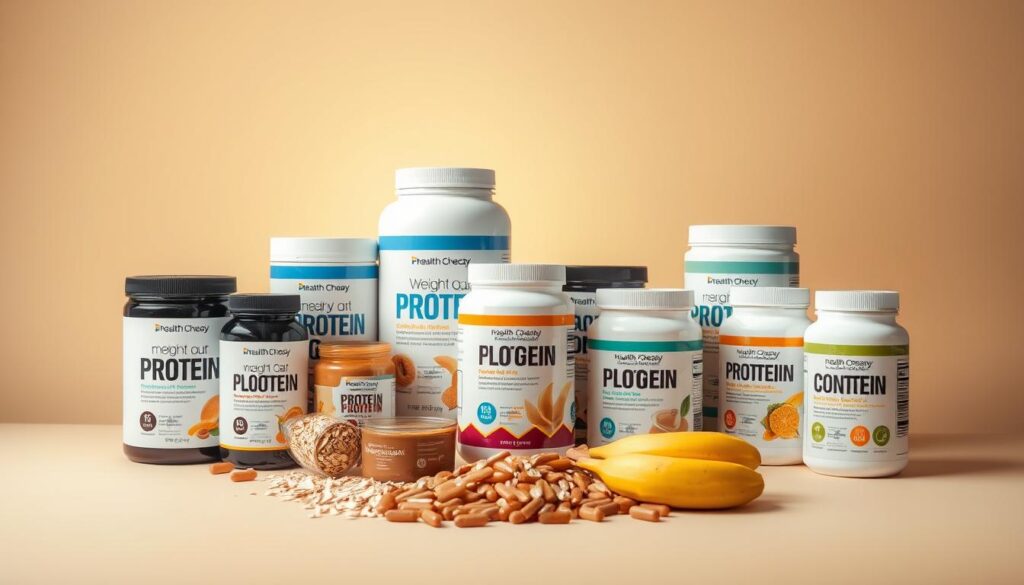
Supplements can help when you eat a balanced diet of weight gain foods list. Start with protein powders like whey or plant-based ones. IronVegan Athlete’s Gainer has 720 calories per serving, with protein, carbs, and fats.
Muscle Milk Pro Series gives 650 calories per scoop. It’s easy to reach your daily calorie needs.
First, eat healthy weight gain foods. Then, use supplements wisely. Protein supplements should have at least 20g protein per serving. Creatine, found in Klean Athlete, helps build muscle with workouts.
A 2022 study found that 1.6g of protein per kg of body weight boosts muscle mass.
- Protein powders: Choose whey, casein, or plant-based options with minimal additives.
- Mass gainers: Opt for NSF-certified brands like NOW Sports Carbo Gain for reliable nutrition.
- Vitamins: B vitamins and vitamin D support metabolism and energy, aiding consistent progress.
Always check labels for NSF or USP-verified seals. Use supplements wisely—eat real foods like nuts, avocados, and eggs first. Talk to a dietitian to make sure your plan fits your goals and health.
Conclusion: Creating Your Personalized Healthy Weight Gain Journey
Your journey to gain weight healthily starts with the right foods. Choose lean meats, whole grains, and healthy fats. Try smoothies with avocado, nuts, or nut butters for a good mix.
Healthy meal ideas include turkey wraps with hummus or oatmeal with seeds and dried fruit. These meals are full of nutrients.
Work with a registered dietitian to make a plan just for you. Aim for 300–500 more calories a day. Also, eat 1.6–2.2 grams of protein for every kilogram of your weight.
Snack on trail mix or Greek yogurt with granola to add calories slowly. Stay away from processed snacks. Instead, eat whole foods like sweet potatoes, bananas, or full-fat yogurt.
Watch how you feel and get stronger, not just the number on the scale. Do resistance training 2–3 times a week to build muscle. Gain 0.5–1 pound each week for lasting results.
There’s no single way to do this. Try different recipes and adjust as you go. With the right foods, meal plans, and expert help, you can build a healthier, stronger body at your own pace.




